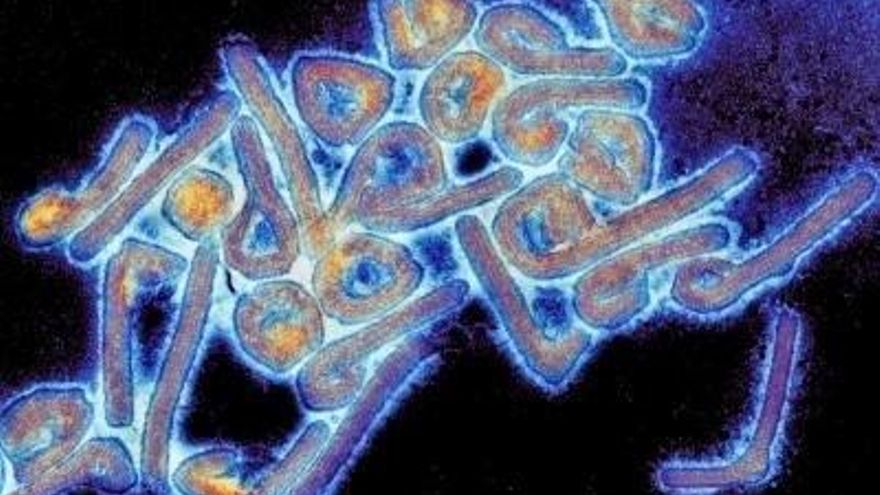
The Nuestra Señora de La Candelaria University Hospital has carried out a simulation of care for a patient infected with the Marburg virus with the aim of learning about the procedures that must be carried out and ratifying the preparation of the center to deal with situations of this type.
The center is one of the seven throughout the national territory that is accredited by the Ministry of Health to provide care for this type of pathology, acting as a receiving center for possible cases that could be detected in other parts of the archipelago, as reported by this Monday the regional Council of the area.
This action was carried out in the Emerging Diseases building of the La Candelaria Hospital, which was specifically designed for this purpose and has specific isolation areas, with automatic closing doors and individual rooms, to facilitate the total separation of the patient from the rest of center users.
During the drill, more than thirty professionals from different departments and services of the hospital complex participated, who have acted following the protocols to maintain the highest safety standards necessary in these cases.
The objective of this action, organized in conjunction with the Canary Islands Emergency Service (SUC), the General Directorate of Public Health and the Tenerife Health Area Directorate, is to put into practice specific protocols that have been developed by the Ministry of Health to respond to the possibility of witnessing a case of infected by this virus, which is from the Ebola family.
In this way, measures can be taken if the situation arises, maintaining the strictest control to prevent the spread.
The exercise began with a call from the SUC alerting a patient who reported the symptoms associated with the virus at home.
Once 112 confirmed that it did indeed meet these characteristics, the hospital was notified so that they could start up the device.
Among the professionals who attended the drill were two SUC teams, made up of three technicians each, and the Hospital’s first intervention team, made up of professionals from different categories and services.
This team consists of cleaning professionals, orderlies, nursing and medicine, Security, Engineering, Management and Logistics professionals, as well as Occupational Risk Prevention.
The Marburg virus is of particular public health importance given its ability to spread, its potential to cause severe disease, and the difficulty in recognizing and treating it.
It can produce an acute fever syndrome characterized by elevated temperature, multisystem involvement, muscle pain, or bleeding that frequently has a poor prognosis.
The General Directorate of Public Health clarifies that the epidemiological link of recent stay in certain areas of countries with active outbreaks of Marburg (Equatorial Guinea and Tanzania) is a key factor of suspicion to take into account in the studies carried out on the patient.
The increase in the frequency and speed of international travel and the transport of goods and animals brings with it an increased risk of importing pathogens from endemic areas to pathogen-free areas.
Hence the importance of keeping the surveillance and action protocols active and carrying out health care simulations in the event of a suspected case of Marburg virus infection.
Since its detection in 1967, various sporadic outbreaks have occurred in Africa, with around 600 cases in Uganda, the Democratic Republic of the Congo, and Angola.
In 2023, outbreaks have been described for the first time in Equatorial Guinea and Tanzania.
Transmission between people occurs by direct contact of broken skin or mucous membranes with blood, secretions, organs, or other body fluids of infected people, as well as with surfaces and materials contaminated with such fluids, such as personal clothing or bedding.
The General Directorate of Public Health has drawn up a care protocol for the Marburg virus that has had the participation of the Canary Islands Emergency Service and the Primary Care departments and that of the Nuestra Señora de Candelaria University Hospital, with which it has coordinated the protocol and drill before the possible arrival on the island of a case of Marburg virus, as has been done with the Ebola virus.
To this end, training has been carried out for all the participating personnel and the health staff of the SUC’s sanitary resource for the care and transfer of those affected by this pathology.
The training has had an impact on self-protection measures, both theoretical and with practical demonstrations, for health personnel and technicians in Health Emergencies to take maximum precautions and avoid contagion.
In addition, the SUC has drawn up the internal action procedure that will be launched when Public Health reports a possible case in Marburg and thus ensure that, both at origin and destination, the protection measures for professionals.
This protocol is connected to the hospital’s own internal protocol, also prepared to provide an effective and safe response to an alarm situation.
As in previous similar cases, when a suspected Ebola or Marburg virus case is detected, the Canary Islands Epidemiological Surveillance Unit will urgently notify the Health Alerts and Emergencies Coordination Center of the Ministry of Health and Social Services and Equality and the National Center for Epidemiology.
Together with the Ministry of Health, this center will assess the measures to be taken and, if necessary, notify the Rapid Response and Attention System of the European Union and the WHO in accordance with the International Health Regulations.
In addition, if a case is confirmed, close contacts will be monitored.















